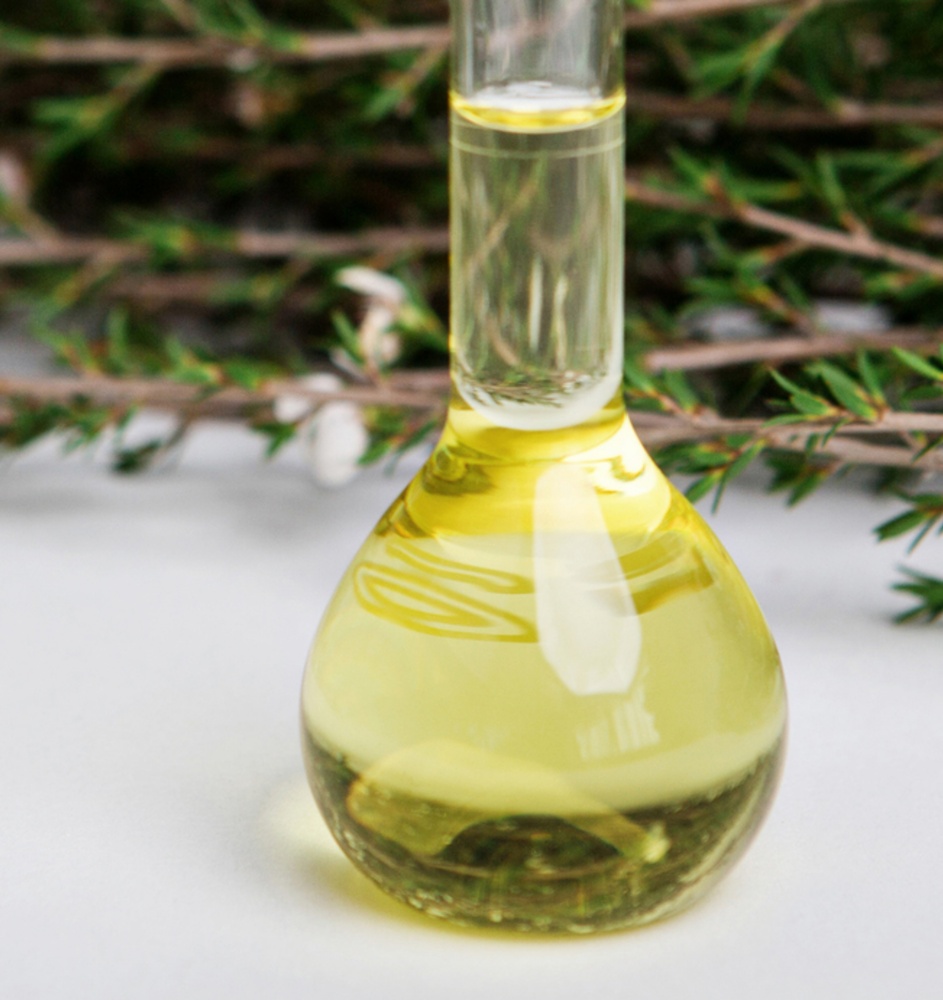Like many essential oils, mānuka oil comes from plants that are abundant in natural healing properties. This can lead people to think that essential oils are harmless and can be used for every application.
Some essential oils have a broad range of safe uses including on the skin, in diffusers for aromatherapy, and even as ingredients in food and beverage products. However, this is not the case for them all.
Essential oils are not regulated, and, in some cases, it can be difficult to assess what is in the bottle, including the plant species, concentration of oil, and even if contaminants are present. Identifying which oils are safe for oral consumption is complicated.
What is mānuka oil, what is its composition, and is it safe to ingest orally? Read on to find out more.
What is Mānuka Oil?
Mānuka oil is an essential oil renowned for its antibacterial, antimicrobial, antifungal, and anti-inflammatory properties. A native to New Zealand, mānuka is harvested in diverse ecosystems from lowland to sub-alpine areas.
Harvesters extract mānuka oil from fresh-cut young brush and leaves of the mānuka tree (Leptospermum scoparium) through steam distillation. The genus belongs to the Myrtaceae family, a plant family rich in leaf oils.
The Growing Popularity of Mānuka Oil
A fun fact about mānuka oil is that it comes from the same mānuka tree that produces mānuka honey. Although the latter is more commonly known, recent studies have shown that mānuka oil is 1,000 times more potent than mānuka honey and 1,500 times more potent than tea tree oil for gram-positive bacteria.
Mānuka oil is relatively new in the world of essential oils, but mānuka was used for centuries by New Zealand’s indigenous Māori people in traditional medical preparations.
Powering the fast-growing awareness of manuka’s unique properties are numerous scientific studies demonstrating the antibacterial, antimicrobial, antifungal, and anti-inflammatory benefits of mānuka oil. These studies identify it as a multifaceted natural healing remedy for a wide range of conditions. These include the skin conditions of dermatitis, psoriasis, eczema, dry skin and acne. It is valuable in wound healing and against hair conditions of dandruff, head lice and itchy scalp. The anti-inflammatory properties are useful for muscle and joint pain, sinus problems, coughs and cold sores. Further studies have shown mānuka oil’s consistency with its ability to inhibit growth and effectively kill a wide spectrum of bacteria, viruses, yeasts, and fungi.
The Chemistry Behind Mānuka Oil

The mānuka plant is celebrated for its exceptional concentration of potent natural compounds, making mānuka oil a highly effective and multifaceted natural remedy. This remarkable oil comprises three distinct chemotypes (strains of plants with different chemistry): monoterpenes (including α-pinene and β-pinene), triketones (featuring flavesone, iso-leptospermone, and leptospermone), and sesquiterpenes (containing α-eudesmol, β-eudesmol, α-caryophyllene, and β-caryophyllene). Combined, these components collectively bestow mānuka oil with antimicrobial, antibacterial, antifungal, and anti-inflammatory properties, making it a valuable therapeutic resource.
It’s crucial to understand that not all mānuka oils are created equal, as their geographical origins significantly influence their antimicrobial activity:
- Mānuka oil from the Northland region boasts high levels of monoterpenes, α-pinene and β-pinenes.
- The East Cape and Marlborough Sounds regions yield mānuka oil with high levels of triketones.
- Other regions across New Zealand produce mānuka oil with lower monoterpenes and a complex blend of sesquiterpenes.
Triketones in mānuka oil have potent antibacterial and antifungal properties, with scientific studies revealing an impressive 99.9% microbial kill rate against a broad range of gram-positive and gram-negative bacteria, such as:
Gram-Positive Bacteria
- Staphylococcus aureus
- Staphylococcus fecalis
- Staphylococcus intermedius
- Pyogenes pyogenes
- Bacillus subtilis
- Propionibacterium acnes
- Listeria monocytogenes
- Clostridium difficle
- Clostridium perfringens
Gram-Negative Bacteria
- Escherichia coli
- Salmonella typhimurium
- Shigella flexneri
- Shigella sonnei
One noteworthy triketone chemotype, leptospermone, effectively inhibits the growth of foodborne gram-positive bacteria such as Listeria monocytogenes, Staphylococcus aureus, and Staphylococcus intermedius. Additionally, it combats intestinal gram-positive bacteria like Clostridium difficile and Clostridium perfringens, while also addressing foodborne gram-negative bacterial pathogens, including Salmonella typhimurium, Shigella flexneri, and Shigella sonnei.
Mānuka oil’s impressive antioxidant properties come from its sesquiterpene compounds. Antioxidants are useful for skin issues caused by UV damage, such as wrinkles, skin inflammation, skin thickening, and collagen fibre degradation.
Mānuka oil also has remarkable antifungal properties, making it a valuable resource for addressing fungal infections like ringworm, athlete’s foot, and toenail fungus.
Mānuka oil’s anti-inflammatory properties further enhance its versatility as a valuable ingredient for skincare formulations aimed at tackling skin issues such as ageing, acne, dermatitis, eczema, psoriasis, and rosacea.
Read our article on how to use mānuka oil for toenail fungus.
Can You Ingest Mānuka Oil?
Pure mānuka oil should never be ingested orally.
This rule applies to essential oils in general unless explicitly recommended by a healthcare professional. It is important to understand the basic principle of solubility; oil and water do not readily mix. Consequently, when essential oils are added to water, they tend to remain on the surface. When ingested, these oils come into direct contact with the mucous membranes, which can be harmful to the digestive tract.
To date, there is no scientific evidence substantiating the safety and benefits of ingesting mānuka oil. Despite this, numerous essential oil companies continue to advocate oral consumption of their products.
It is important to practice caution as individuals vary in their responses to essential oils just as they do in reacting to medications and products when applied topically or consumed orally. What’s more, anyone can develop allergies to various substances, irrespective of whether they induce allergic reactions in others.
So…Why Is Ingesting Mānuka Oil and Other Essential Oils Dangerous?
Mānuka oil, like other essential oils, is a highly concentrated oil that can be dangerous and toxic when ingested. There may be a misconception that because mānuka oil is natural, it is safe for all types of uses.
Despite their natural origin, essential oils are not inherently safe for ingestion. The molecules and chemical compounds that make up mānuka oil and other essential oils are irritating to mucous membrane tissue. When taken orally, these essential oils may lead to irritation in the mouth, esophagus, gut lining, and further along the digestive tract. Symptoms such as nausea, stomach pain, and neurological discomfort, including nerve pain and numbness, can manifest particularly with excessive consumption. It’s worth noting that individual responses to essential oils may vary.
To navigate the use of essential oils, it’s important to recognize that not all oils are created equal. While the Food and Drug Administration (FDA) maintains a list of essential oils that are Generally Recognized As Safe (GRAS), this list is not absolute. Moreover, the FDA does not regulate essential oils, making it essential to exercise caution when selecting a brand. Look for reputable brands that provide transparency regarding the sourcing of plants and the extraction methods used to ensure safer usage..
Why do People Prefer to Ingest Essential Oils?

While essential oils are primarily known for their aromatic qualities, some individuals choose to ingest them for a more concentrated impact through digestion, as suggested by Amy Galper, a certified aromatherapist.
As a consumer, it is crucial to distinguish between those considered safe for use and others that should be categorically avoided.
How to Use Mānuka Oil Correctly
Mānuka oil is a pure oil that can be used in four ways:
- Aromatically:
- Employ a diffuser to disperse the aroma of mānuka oil throughout the living space.
- Engage in direct inhalation by holding a bottle of mānuka oil near the nose.
- Opt for indirect inhalation by placing a drop of mānuka oil on a cloth, handkerchief, shirt collar, or pillowcase.
- Create a steam tent by adding mānuka oil to a bowl of hot water, covering yourself with a towel or comforter, and inhaling the soothing steam. It is essential to dilute mānuka oil with a carrier oil like jojoba or almond oil, using a low ratio, typically 1 part mānuka oil to 10 parts carrier oil. Before widespread application, it is advisable to conduct a small patch test to ensure compatibility with the skin.
- Topically:
- Apply mānuka oil directly to the skin for targeted benefits.
- Dilute it with a carrier oil to fashion a nourishing hair mask or a potent balm for various skincare applications.
- Internally:
- For gargling purposes only, add 3-4 drops of mānuka oil to a glass of warm water. However, it is crucial to emphasize that mānuka oil should not be ingested or swallowed.
- Externally (Around the Home):
- Leverage the potent properties of mānuka oil as an effective insect repellent.
- Utilize it as a natural deodorizer, mould killer, or as a powerful cleaning agent to maintain a fresh and hygienic living environment.
- These diverse applications underscore the versatility and utility of mānuka oil in various aspects of daily life.

